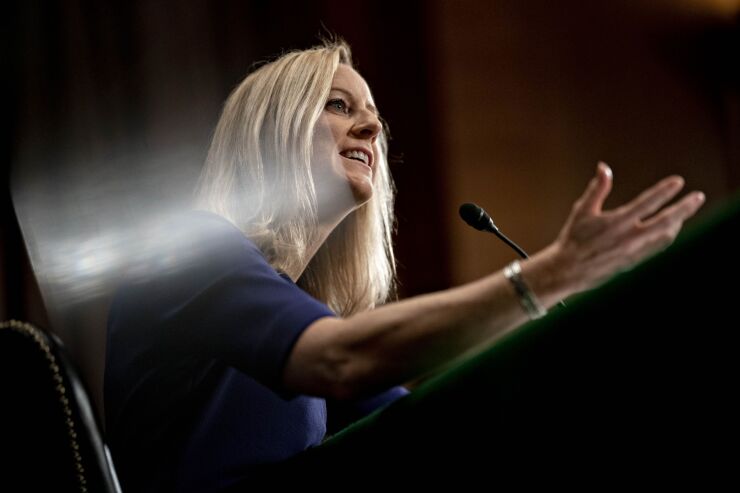Want unlimited access to top ideas and insights?
The Consumer Financial Protection Bureau completed a rule gutting limits on payday lenders, delivering long-anticipated regulatory relief to the small-dollar lending industry.
The final rule released Tuesay rescinds underwriting requirements that had been imposed in a 2017 regulation under former CFPB Director Richard Cordray. Eliminating the “ability to repay” standards has long been a policy goal of the Trump administration.
The changes developed under CFPB Director Kathy Kraninger are projected to save the payday lending industry more than $7 billion a year. But the new rule will
Cordray’s 2017 rule had sought to eliminate repeat re-borrowings by a single user, citing the CFPB’s own data showing that payday lenders rely on such re-borrowings as a major source of revenue. In a press release Tuesday, the bureau said there was "insufficient legal and evidentiary bases" for the 2017 rule’s mandatory underwriting provisions.
Kraninger has favored easing up on limits to payday loans. She said the CFPB will continue to monitor the small-dollar lending industry and enforce the law against bad actors.

“Our actions today ensure that consumers have access to credit from a competitive marketplace, have the best information to make informed financial decisions, and retain key protections without hindering that access,” Kraninger said in the press release. “The Bureau protects consumers from unfair, deceptive, or abusive practices and takes action against companies that break the law."
The CFPB said it will also undertake new research focusing on identifying information that could be disclosed to consumers during the small-dollar lending process to allow them to make the most informed choices.
The bureau said it also is going to implement payment provisions in the 2017 final rule that never went into effect. The provisions prohibit lenders from withdrawing funds from a consumer's bank account after two consecutive failed attempts unless consumers consent to further withdrawals. The payment provisions also require that lenders provide consumers with written notice before making their first attempt to withdraw payment from a bank account. The payment provisions are intended to increase consumer protections from harm associated with lenders’ payment practices.
Payday lenders lobbied heavily to rescind the 2017 rule because it would have eliminated 55% of revenue for lenders that offer loans of 45 days or less.
Under Cordray, the CFPB conducted research over five years to write the 2017 payday rule, which never went into effect.
But shortly after the Trump administration appointed former Mick Mulvaney to succeed Cordray, Mulvaney, as acting director,
Kraninger, a Mulvaney protege, agreed with Mulvaney
The CFPB’s final rule comes after four other federal regulatory agencies released
The Federal Deposit Insurance Corp. also announced plans to rescind two older letters that banks had blamed for their reluctance to offer more credit options to cash-strapped consumers.
Still, the CFPB’s payday rule almost certainly faces the prospect of a legal battle.
A likely legal challenge could come from the consumer groups Public Citizen and the National Consumer Law Center. Consumer groups are expected to argue that the CFPB violated the Administrative Procedure Act that requires rigorous research and analysis, not just a policy disagreement, to change existing rules.
Congressional Democrats could also attempt to take action to repeal the rule.
Under the Congressional Review Act, Congress can overturn agency rules by a simple majority vote if lawmakers vote within 60 legislative days of a rule being published in the Federal Register.
A potential lawsuit by a consumer advocate might highlight that the bureau did not actually challenge the CFPB’s previous research, according to
Kraninger faces a potential backlash from House Democratic leaders, who are looking to impose a 36% interest rate cap on consumer credit. State attorneys general also could be involved in a lawsuit. Currently,
Consumer advocates said the CFPB’s payday rule will leave 12 million consumers who use payday loans vulnerable to lenders charging annual interest rates of roughly 400%.
“Amid a global pandemic and an economic contraction with little precedent, the CFPB has chosen to devote scarce resources not to protecting consumers, but to dismantling guardrails that would have given people more protection from predatory lenders,” said Linda Jun, senior policy counsel at Americans for Financial Reform.
In addition to the rule, the CFPB has tried to expand access to credit by encouraging banks to offer installment loans or lines of credit for amounts of up to $2,500. In May, the CFPB issued a no-action letter template designed to allow companies to develop such credit products without fear of supervisory action. The template, requested by the Bank Policy Institute, could be used by banks interested in providing small-dollar loans.
Richard Hunt, president and CEO of the Consumer Bankers Association, said the rule will help banks provide much needed small-dollar loans to consumers.
“Millions of Americans live paycheck to paycheck, leaving consumers with less cushion for emergencies and fewer credit options during unprecedented times like COVID-19,” Hunt said in a statement. “This new rule will prevent more Americans from turning to less consumer-friendly alternatives to fund their short-term liquidity needs.”
Going forward, payday lenders will have to start preparing their systems for the payment provisions of the payday rule. The CFPB said it will seek to have the payment provisions go into effect “with a reasonable period for lenders to come into compliance.”





